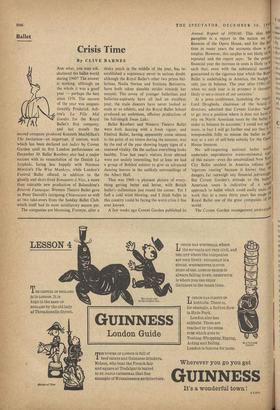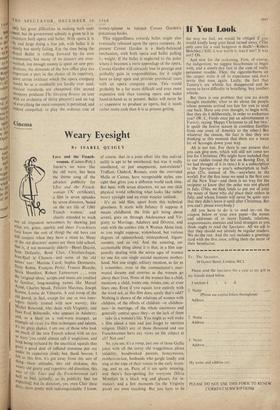Ballet
Crisis Time
By CLIVE BARNES AND what, you may ask, shattered the ballet world during 1960? The answer is nothing, although on the whole it was a good year — perhaps the best since 1956. The success of the year was unques- tionably Frederick Ash- ton's La Fille Mal Gardde, for the Royal Ballet's first company, and last month the second company produced Kenneth MacMillan's The Invitation—an important, if uneven, work which has been declared sub judice by Covent Garden until its first London performance on December 30. Ballet Rambert also had a. major success with its resuscitation of the Danish La Sylphide, faring less happily with Norman Morrice's The Wise Monkeys, while London's Festival Ballet offered, in addition to the ghastly and short-lived Bonaparte a Nice, a more than tolerable new production of Balanchine's Bourree Fantasque. Western Theatre Ballet gave us Peter Darrell's intriguing Chiaroscuro as well as two take-overs from the Sunday Ballet Club, which itself had its most satisfactory season yet.
The companies are blooming. Fonteyn, after a shaky patch in the middle of the year, has re- established a supremacy never in serious doubt, although the Royal Ballet's other two prima 1:41- lerinas, Nadia Nerina and Svetlana Beriosova, have both taken sizeable strides towards her summit. The covey of younger ballerinas and ballerina-aspirants have all had an excellent year, the male dancers have never looked so male or so athletic, and the Royal Ballet School produced an ambitious, efficient production of the full-length Swan Lake.
Ballet Rambert and Western Theatre Ballet were both dancing with a fresh vigour, and Festival Ballet, having apparently come almost to the point of no return during the summer, was by the end of the year showing happy signs of a renewed vitality. On the surface everything looks healthy. True last year's visitors from abroad were not unduly interesting, but at least we had a group of Bolshoi soloists to give us advanced dancing lessons in the unlikely surroundings of the Albert Hall.
That was 1960—a pleasant picture of every- thing getting better and better, with British ballet's millennium just round the corner. Yet I feel a cold wind blowing, and I think ballet in this country could be facing the worst crisis it has ever known.
A few weeks ago Covent Garden published its Annual Report of 1959160. This slim blue pamphlet is a report to the nation on lit finances of the Opera House, and for the fir° time in many years the accounts show a llei surplus. However, this surplus is not likely to V repeated and the report says: 'In the preset financial year the increase in costs is likely to be such that, even with the substantial earning guaranteed to the rigorous tour which the Roll Ballet is undertaking in America, the budget i5 only just in balance. The year after 0961/0 when no such tour is in prospect is therefore likely to see a return of our anxieties.' At a press conference, launching the report; Lord Drogheda, chairman of the board directors, admitted that Covent Garden to get into a position where it does not have t° rely on North American tours by the ballet ill order to balance its accounts.' I could not agree more, in fact I will go further and say that it 0 irresponsible folly to misuse the ballet in thil way as a sort of self-help subsidy for the OPee3 House finances. No self-respecting national ballet would undertake unproductive transcontinental tot°, of this nature—even the unsubsidised New Yofi City Ballet resident in America refuses soch `rigorous touring' because it knows that 0 dangers far outweigh any financial .advantages; But Covent Garden's attitude to the balleti American tours is indicative of a whole approach to ballet which could easily undo the work that in a mere thirty years has made ° Royal Ballet one of the great pompanies of tile world. The Covent Garden management, understand' -00 ably has great difficulties in making both ends 'Meet, but its government subsidy is given to it to maintain both opera arid ballet. With opera it is hY and large doing a line job, with ballet it is slowly but surely failing. For the time being the Royal Ballet is rolling forward by its own momentum, but many of its dancers are over- worked, not enongh money is spent on new pro- ductions, the demands of the box office play too lillportant a part in the choice of its repertory, West artists (without which the opera company Would be at a standstill) are 'hardly ever used, Musical standards are cheapened (the second Company produces The Sleeping Beauty on tour With an orchestra of thirty players!) and on top of everything the main company is permitted, and indeed compelled, to play the arduous role of
money-spinner to balance Covent Garden's precarious books.
This niggardliness towards ballet might also eventually rebound upon the opera company. At present Covent Garden is a finely-balanced mechanism, with both opera and ballet pulling it.; weight. If the ballet is neglected to the point where it becomes a mere appendage of the opera, Covent Garden will certainly lose in prestige and probably gain in responsibilities, for it might have to keep open and provide provincial- tours with an opera company alone. This would probably be a far more difficult and even more expensive task than running opera and ballet hand-in-hand as at present.. Ballet will never be ac expensive to produce as opera, but it needs rather more cash than It is at present getting.



































 Previous page
Previous page